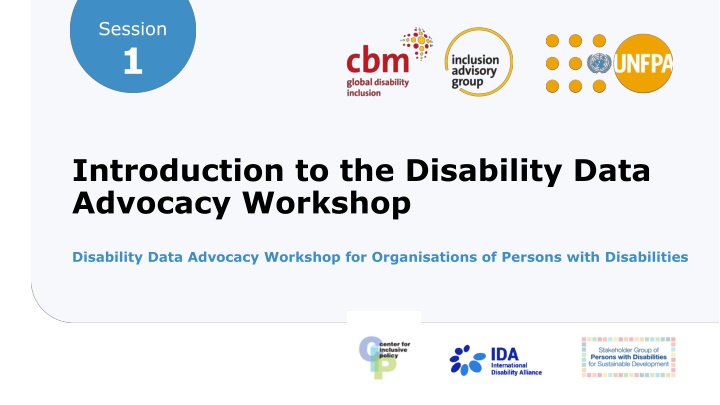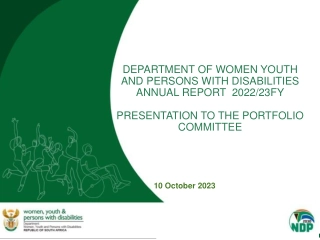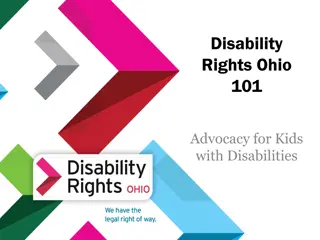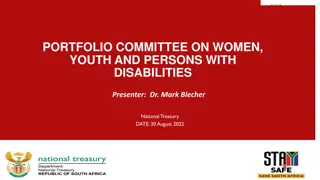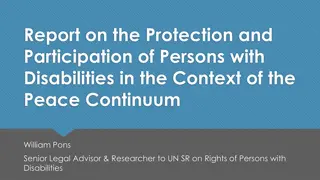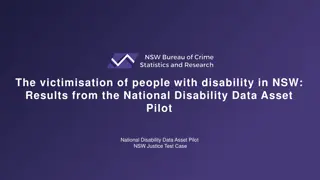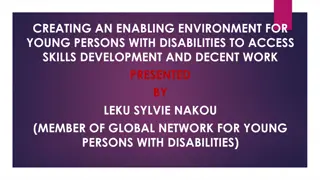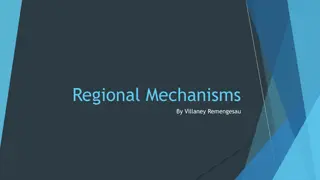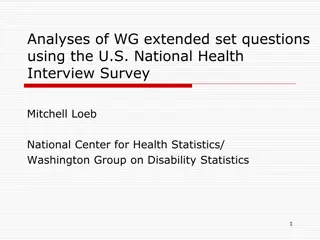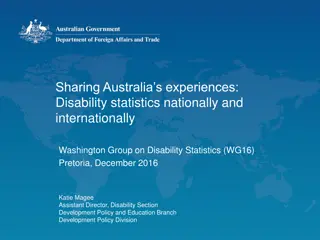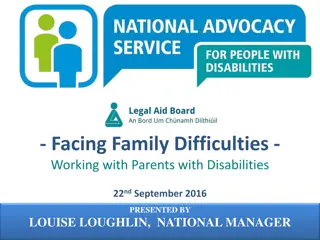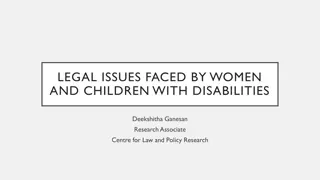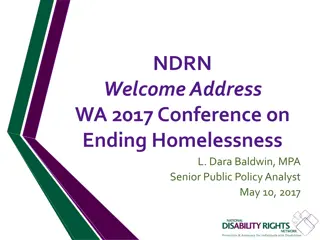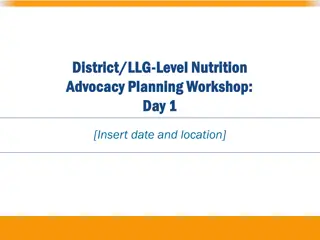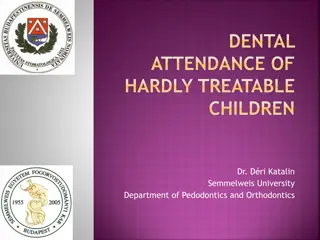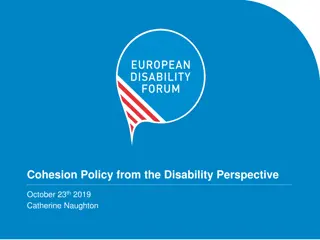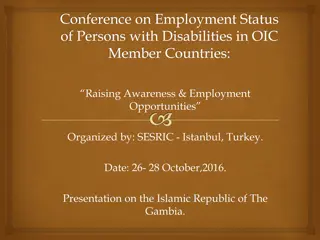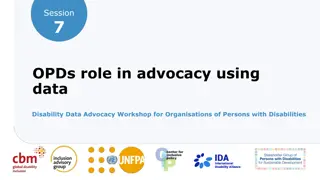Disability Data Advocacy Workshop for Organizations of Persons with Disabilities
Explore the comprehensive Disability Data Advocacy Workshop covering various sessions focusing on advocacy, data collection, evidence development, and engagement in national dialogues using data. The workshop aims to equip participants with essential knowledge and skills for effective disability data advocacy.
Download Presentation

Please find below an Image/Link to download the presentation.
The content on the website is provided AS IS for your information and personal use only. It may not be sold, licensed, or shared on other websites without obtaining consent from the author.If you encounter any issues during the download, it is possible that the publisher has removed the file from their server.
You are allowed to download the files provided on this website for personal or commercial use, subject to the condition that they are used lawfully. All files are the property of their respective owners.
The content on the website is provided AS IS for your information and personal use only. It may not be sold, licensed, or shared on other websites without obtaining consent from the author.
E N D
Presentation Transcript
Session 1 Introduction to the Disability Data Advocacy Workshop Disability Data Advocacy Workshop for Organisations of Persons with Disabilities
Opening remarks 2 Disability Data Advocacy Workshop for Organisations of Persons with Disabilities SESSION 1
Introductions 3 Disability Data Advocacy Workshop for Organisations of Persons with Disabilities SESSION 1
Overview of the workshop 4 Disability Data Advocacy Workshop for Organisations of Persons with Disabilities SESSION 1
Setting expectations Expectations What are you hoping to get from this workshop? What questions would you like to have answered? Contributions What are you hoping to contribute or to share? What is your experience with disability data or data advocacy? 5 Disability Data Advocacy Workshop for Organisations of Persons with Disabilities SESSION 1
Workshop objectives Be able to advocate for data collection and investment in better data. Be able to use data to develop evidence in support of advocacy messaging. Begin to apply relevant knowledge and skills on disability data in the local context. Have basic data advocacy knowledge and suitable skills to engage in national and regional dialogues using data. 6 Disability Data Advocacy Workshop for Organisations of Persons with Disabilities SESSION 1
Workshop sessions Session 1: Introduction to the Disability Data Advocacy workshop Session 2: Leave no one behind: The critical role of data disaggregation Session 3: Identifying the population with disabilities using the Washington Group Questions Session 4: Beyond disaggregation Session 5: Disability data sources and quality Session 6: How to advocate for better data Session 7: OPDs role in advocacy using data Session 8: Building an action plan and closing 7 Disability Data Advocacy Workshop for Organisations of Persons with Disabilities SESSION 1
Workshop format Typically, 90-minute sessions An OPD-led facilitation team Mix of presentation, discussion and group activities Building on participants knowledge and experience Questions are welcome An inclusive workshop environment Individual Reflection Introduce worksheet 8 Disability Data Advocacy Workshop for Organisations of Persons with Disabilities SESSION 1
Global frameworks and disability data 9 Disability Data Advocacy Workshop for Organisations of Persons with Disabilities SESSION 1
Data - definitions Data is pieces of information about individual members of groups, whether people or things, that when combined and analysed describe the characteristics of that group. Quantitative data express a certain quantity, amount, or range recorded as numbers. Qualitative data express qualities or characteristics, usually through descriptive narratives. Both quantitative and qualitative data are valuable in establishing evidence to support an argument or position, and they are often combined to provide a complete picture. Quantitative data provides scope and scale of the issue; whereas qualitative data provides a richness of detail of people s lives. Citizen-generated data is data that individuals, communities, or their organisations produce to directly monitor, demand, or drive change on issues that affect them. 10 Disability Data Advocacy Workshop for Organisations of Persons with Disabilities SESSION 1
Why do we need disability data? Understand the real situation of persons with disabilities Identify gaps that are not addressed through policies Provide examples of successes Support evidence-based advocacy and to influence decision makers at all levels Provide the beginning and foundation to all other efforts. 11 Disability Data Advocacy Workshop for Organisations of Persons with Disabilities SESSION 1
Disability Data Advocacy Toolkit The Stakeholder Group of Persons with Disabilities, the International Disability Alliance, and CBM Global Disability Inclusion launched the first comprehensive disability data advocacy toolkit in 2020. To contribute to the global dialogue on the importance of data on persons with disabilities. The toolkit highlights two aspects of data: the need for data how to analyse, use, and trust data to create advocacy messaging 12 Disability Data Advocacy Workshop for Organisations of Persons with Disabilities SESSION 1
The CRPD and disability data States are obligated to carry out their responsibility to collect and disaggregate data in line with the UN Convention on the Rights of Persons with Disabilities under Articles 3 and 31. The CRPD calls for all types of data to be gathered. Calls for data to inform policymakers to support CRPD implementation. States Parties need to closely consult with and actively involve persons with disabilities, including children with disabilities, through their representative organisations under Article 4.3. 13 Disability Data Advocacy Workshop for Organisations of Persons with Disabilities SESSION 1
The 2030 Agenda and disability data In 2015, 193 countries committed to collect data on persons with disabilities and to disaggregate data by disability by adopting the 2030 Agenda for Sustainable Development and its Sustainable Development Goals (SDGs). In 2017, the global indicator framework was adopted, which provides a guide to measure SDG progress. 14 Disability Data Advocacy Workshop for Organisations of Persons with Disabilities SESSION 1
Global SDG indicator framework Has 231 global indicators, 11 are disability inclusive. Calls to disaggregate (or specifically collect disability data) SDGs by disability. Data and information from national and international reports should be used. Overall disability data is not internationally comparable which leaves a disability data gap to measure the SDGs. 15 Disability Data Advocacy Workshop for Organisations of Persons with Disabilities SESSION 1
In order to advocate Who makes up the population of persons with disabilities in your country (compared to other countries)? What are the characteristics of the population with disabilities in your country in terms of age, gender, residence, and disability type? Does the population with disabilities participate in society to the same extent as those without disabilities? For example, do they experience the same levels of employment, income, education, and civic engagement? What are the barriers that limit full inclusion and equity? Are current policies and services adequate to address the barriers? Is data available to address the questions raised above? 16 Disability Data Advocacy Workshop for Organisations of Persons with Disabilities SESSION 1
End of session Please complete Individual Reflection Sheets for this session 17 Disability Data Advocacy Workshop for Organisations of Persons with Disabilities SESSION 1
